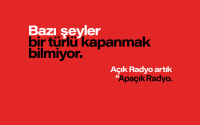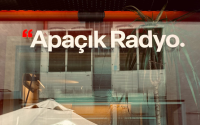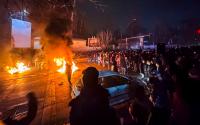Common Dreams / Published on Monday, November 28, 2005 by Broadcasting & CableJohn Eggerton
Bill Moyers became the central figure in absentia in the controversy surrounding former Corporation for Public Broadcasting (CPB) Chairman Kenneth Tomlinson. It was Tomlinson who pointed to Moyers' Now newscast on PBS as a chief reason for his efforts to bring "balance" to public broadcasting by adding conservative shows. Moyers has since left Now and is currently president of the Schumann Center for Media & Democracy. He spoke with B&C's John Eggerton in the wake of a CPB Inspector General report concluding Tomlinson had violated the law by dealing directly with a programmer during the creation of a show to balance Moyers' program.
You are the exemplar of liberal PBS bias, according to Ken Tomlinson. Was your show liberally biased?
Right-wing partisans like Tomlinson have always attacked aggressive reporting as liberal.
We were biased, all right—in favor of uncovering the news that powerful people wanted to keep hidden: conflicts of interest at the Department of Interior, secret meetings between Vice President Cheney and the oil industry, backdoor shenanigans by lobbyists at the FCC, corruption in Congress, neglect of wounded veterans returning from Iraq, Pentagon cost overruns, the manipulation of intelligence leading to the invasion of Iraq.
We were way ahead of the news curve on these stories, and the administration turned its hit men loose on us.
Tomlinson actually told The Washington Post that he was irate over one of our documentary reports from a small town in Pennsylvania hard-hit by outsourcing.
If reporting on what's happening to ordinary people thrown overboard by circumstances beyond their control and betrayed by Washington officials is liberalism, I stand convicted.
It is an old canard of right-wing ideologues like Tomlinson to equate tough journalism with liberalism. They hope to distract people from the message by trying to discredit the messenger.
Now threw the fear of God into Tomlinson's crowd because they couldn't dispute the accuracy of our reporting.
And when we weren't reporting the truth behind the news, we were interviewing a wide variety of people: Ralph Reed and Ralph Nader; Cal Thomas and Molly Ivins; Robert Bartley, editor of the Wall Street Journal; Katrina Vandenheuval, editor of The Nation; The Conservative Union's David Keene; Dorothy Rabinowitz (also of the Wall Street Journal); Charles Lewis of the Center for Public Integrity; the Club for Growth's Stephen Moore; historian Howard Zinn; and Indian activist Arundhati Roy. And on and on.
Did you get any direct pressure from Tomlinson or CPB to change the content of your show?
The people at PBS told me they were getting excruciating pressure because of our reporting, including threats to de-fund public television unless "Moyers is dealt with." They never identified the source of that pressure.
We know now it was Tomlinson. [Tomlinson] even told some people [we have confirmed it with two people who were present] that "Moyers is a coward because he doesn't want to talk to people who disagree with him."
Hello? See the above list of all the conservatives who appeared on the show.
What happened to the debate idea between you two?
I asked him repeatedly. He refused. He didn't even respond. But when all this started to unfold early last year, I asked three times to meet with the CPB board and try to find out what was going on.
I thought we could reason together and maybe agree on how to cooperate to protect Public Broadcasting's independence. I mean, I not only read the Public Broadcasting Act of 1967, I helped to create it. CPB's job was to be a firewall between guys like them and the producers, journalists, and content of public broadcasting.
I thought at the time that I was dealing with people who cared about this institution. I didn't realize they had gone over to the dark side.
What prompted your departure from Now?
I needed a break, and I also sensed that we were up against serial abusers and that I could fight back more effectively if I weren't on the air.






